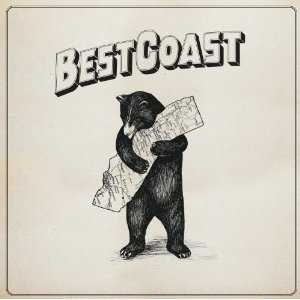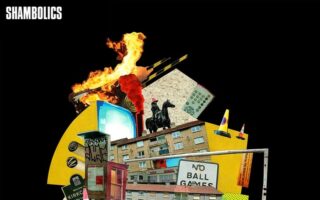 Bursting through a fuzzy bubblegum cloud of popularity and adulation with their first full-length effort two years ago, Best Coast have finally set upon delivering their second album, a dangerous predicament for a band so infused and rooted into such a distinct style of warm psychedelic pop.
Bursting through a fuzzy bubblegum cloud of popularity and adulation with their first full-length effort two years ago, Best Coast have finally set upon delivering their second album, a dangerous predicament for a band so infused and rooted into such a distinct style of warm psychedelic pop.
Made up of primary songwriter and vocalist Bethany Cosentino and her right-hand multi instrumentalist Bobb Bruno, Best Coast struck a magic chord with 2010’s ‘Crazy For You‘, venturing into imperial hipsterdom with its blissfully crafted pop melodies, momentous amounts of reverb, and stripped-bare lyrics that held tons of yearning sentimentalism.
‘The Only Place‘ doesn’t incite a whole lot of expectation upon first impression. In essence, Cosentino was either going to do something wildly different to deter any reservations about her caricatured style of writing or, as seems to have come about, she was going to maintain the exact same style that so enamoured the group’s debut, in the hope that her likeable sensibility and warm pop craftsmanship would be enough to keep the band relevant and at favour with their musical peers.
‘The Only Place’ has clearly veered towards the latter, dangerously bordering on a tired format that whilst bristled throughout the novelty of ‘Crazy For You’, becomes stale and unwelcome only a few tracks in the new record.
The title track instantly comes across as uninspired and laboured in comparison to gems such as ‘Boyfriend’ and ‘Crazy For You’ from the first album. Realising its inability to imitate the joyous shuffle of those songs, it seems content on brimming about lifelessly, offering no insight into Cosentino’s songwriting qualities, but rather presenting itself as something that she would expect as the opener to her second album, foolishly mis-judging its stale lyrics as being enough to carry the weight of the Best Coast image and agenda.
Likewise, ‘Why I Cry’ and ‘Last Year’ hint at the band’s best qualities, but ultimately seem powered by batteries, re-instating the Best Coast sound without offering any sense of direction or expansionism. In such a context, ‘The Only Place’ can feel like the work of a cover band – nailing the sound and feel that we are now so familiar with, but rarely instating the invigoration and novelty of the debut.
Perhaps the greatest measure of ‘The Only Place’s true worth is the black and white illustration of a Bear clutching a Californian road map on the album’s cover. Like the cool stare of the cat that graced the cover of ‘Crazy For You’, the bear seems warm and inviting, but like the songs of ‘The Only Place’, the image is without colour and is hardly as striking.
But maintaining the lucid and fuzzy feel of the debut are tracks such as ‘Do You Love Me Like You Used To?’ and ‘Dreaming My Life Away’; holding droves of simplistic sentimentalism within their lyrical themes. Similarly, ‘Up All Night’ is a graceful balladic turn that remains true to the band’s upbeat Californian rhetoric, closing the album assuredly through clashing guitars and impressive vocals.
The imagery is not lost, the melodies are still partly there, and the brisk warmth of the Californian sun still shines through the best parts of the album. In fact, it is actually a lot better than this review is making it sound. It’s a fulfilling and strong record in any context, but just not as a Best Coast album. We expected more; there seemed to be more wit and craftsmanship within Cosentino to sweep us off our feet once again – the fact that this clearly hasn’t happened is a considerable letdown.
The lyrics are just as simple, but with less emotional power, the structures to the point, but with less staying power. The verse-chorus-verse-chorus aesthetic doesn’t change at all throughout the course of the album, and it becomes a bore by the record’s conclusion. But as it is, ‘The Only Place’ is still a Best Coast album. Just as a Weird Al Yankovic record is still a Weird Al Yankovic record.
Hopefully, however, Cosentino and co. progress beyond the band’s self-enforced musical boundaries in the future.



